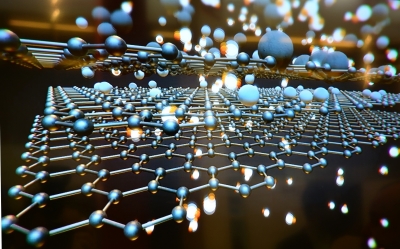Researchers design a strategy to make graphene luminescent
Escrito por UCC+iA University of Cordoba research project is able to incorporate luminescence into this super material, paving a new way to continue expanding properties
A University of Cordoba research team is able to manufacture electric car batteries with this raw material and increase their travel range by 60%
Climate change is a reality and its consequences are becoming evermore evident. Governments of the main world countries are taking measures to tackle this problem. One of the most controversial aspects stemming from this problem is the possible future prohibition of vehicles powered by fossil fuels. Last November, the Spanish government proposed ending the sale of cars and commercial vehicles running on gas, diesel, and natural gas as well as hybrids after 2040. This initiative has already been raised in countries such as the United Kingdom and France. This annoucement by the executive government is expressed in the future Climate Change and Environmental Transition Law, which will contribute to Spain being able to fulfill its international commitments against global warming.
An international team has identified the genes that make these plants resistant to the pathogen that attacks crops belonging to the cabbage family all over the world
From Brussels, China or Milan. "Surnames" aside, cabbages are grown nowadays all over the world. Like them, many other plants from the Brassicaceae family such as cauliflower, broccoli, cabbage and even mustard -yes, strange as it may seem and though their tastes are very different, a Brussels sprout and a mustard seed belong to the same family- have a common enemy: white rust, or at least one kind of white rust. Specifically, cabbages are threatened by a disease caused by a pathogen called Albugo candida, which acts exactly like a fungus, though it is not actually a fungus. That is to say, it spreads under the right conditions of humidity and temperature and eats up the nutrients of the plants it attacks.
Calcium passes the test to substitute lithium in rechargeable batteries for electric cars
Escrito por UCC+iResearch at the University of Cordoba shows the potential of calcium to be a component of batteries in the future at an theoretical and experimental level, due to it polluting less and its plentiful supply
One possible solution to pollution in cities from combustion engines is the use of electric vehicles. Currently lithium ion batteries are the most commonly used in electric vehicles. However, they are not free from problems. Foreseeably, lithium resources will be insufficient to cover the battery market in the future. In addition, lithium batteries are not as safe as can be and they contain toxic components that are environmentally damaging.
Concrete made from coal ashes proves to be just as resistant as concrete from quarry aggregates
Escrito por UCC+iA University of Cordoba research team in partnership with the University of Navarra successfully uses waste from thermoelectric plants instead of natural resources to make concrete for structural use and demonstrates that it has the same characteristics for construction.
Overexploitation of quarries in order to obtain sand and gravel needed to produce concrete is currently one of the most challenging environmental issues. Rocks are not inexhaustible, though they may seem. So, for years the scientific community has been searching for a way to manufacture concrete without depleting the Earth’s crust. This is done by approaching the issue from different perspectives. This is the case of two University of Cordoba research teams that worked together in order to obtain a material that is just as sturdy and durable, but more sustainable. This was done by chemists and engineers working closely together.
A new analysis system is able to identify pollutants from cosmetics in seawater
Escrito por UCC+iA University of Cordoba study, in partnership with the University of the Balearic Islands, uses carbon-coated titanium dioxide nanotubes to analyze samples affected by parabens from lotions and shampoos
A University of Cordoba research group has designed a method that detects the presence of pollutants in seawater in a faster and more efficient way and also at very low concentrations. Specifically, the team from Cordoba, in partnership with the University of the Balearic Islands, focused on several substances used as preservatives in soap, lotion and deodorant, which end up in the sea. Concerns about parabens and triclosan have been voiced from different sectors, and the European Commission has been monitoring these substances and limited their use. Parabens and triclosan keep bacteria and fungi from damaging shampoo and toothpaste, but they become a real problem once they get to the sea, where they affect the marine ecosystem. Identifying their presence contributes to the design of measures that correct their effects. This is the idea behind the work on the system designed by the University of Cordoba.







